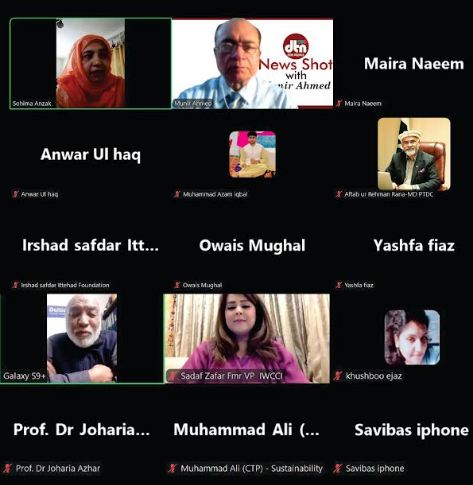Devcom-Pakistan National Online Consultation suggests waste segration, reuse and recycling awareness, skill and engagement at an age of 5.
ISLAMABAD, APR 12 /DNA/ – Experts from diverse sectors including education, tourism, government, civil society, and environmental advocacy came together in a national online consultation organized by Devcom-Pakistan under the theme “The Earth Care Pledge – Engaging Youth for a Zero Waste Pakistan” on Saturday. Participants called for innovative and actionable strategies to engage Pakistan’s 64 percent youth population in reducing the country’s escalating waste crisis.
Key recommendations emphasized the need to integrate zero waste principles into school and university curricula, develop youth-led green enterprises, promote digital campaigns, and establish a National Youth Environmental Corps. Panelists also stressed incentivizing waste segregation and recycling through gamified mobile applications and creating campus-based “Green Ambassadors” networks to advocate sustainable lifestyles in their communities.
Pakistan generates an estimated 3.9 million tons of plastic waste annually, with around 65 percent being mismanaged, ending up in landfills, waterways, or burned in the open. Nearly 48,000 tons of solid waste is produced daily in urban centers, much of it comprising organic, plastic, electronic, and construction debris. Only 10 percent of total waste is currently recycled, while the rest burdens the environment, posing significant health and climate risks.
Speaking at the event, Munir Ahmed, founder and Executive Director of Devcom-Pakistan, said, “With over 140 million young people in the country, we have the largest human capital in our history. If engaged meaningfully, youth can transform Pakistan’s waste crisis into a circular economy opportunity. The Earth Care Pledge is a call for action — not just to reduce waste, but to rethink our consumption patterns altogether.”
He said Devcom-Pakistan’s annual World Earth Day event “The Earth Care Pledge to focus on the launch of Zero Waste Pakistan initiative. A Zero Waste Pakistan is not just a vision—it’s a necessity. Through collective action, innovation, and policy reforms, we can break free from plastic pollution and safeguard our environment for future generations. Empowering youth with the concepts of waste segregation, reuse and recycling at source of the waste generation such as homes and institutions will lead the society to a zero waste Pakistan.”
Participants from Gilgit-Baltistan, Azad Jammu and Kashmir, Sindh, Balochistan, and Punjab shared regional insights, highlighting the lack of localized waste management policies and limited awareness among youth. Representatives from the Ministry of Climate Change, provincial EPAs, and civil society organizations committed to collaborate on a long-term youth engagement strategy under the Earth Care Pledge initiative.
Aftab-ur-Rehman Rana, PTDC Managing Director and sustainable tourism expert, said we need to develop skills of the young and school children through curriculum, particle activities.
Dr Sohima Anzak urged for ‘innovative idea competition’ to reduce waste and recycle at the university and college level every semester. The best ideas shall be given certification and encouragement awards. She also stressed for behaviour change initiatives and leadership skills development for a sustainable environment. Others who spoke on the occasion included Maria Naeem, Anwar ul Haq, Hamza Bashir, Azeem Iqbal, Nusrat Bano, Yashfa Fiaz, Owais Mughal, Irshad Safdar, and Riffat Ara Baig.
The consultation concluded with a collective commitment to launch nationwide campaigns led by youth champions, promote plastic alternatives, and organize Zero Waste Innovation Challenges to encourage sustainable startups. Devcom-Pakistan will host follow-up sessions and pilot projects in universities and schools ahead of World Earth Day and World Environment Day.

















